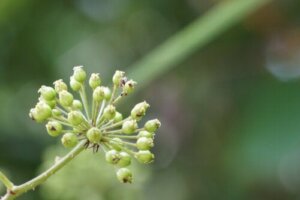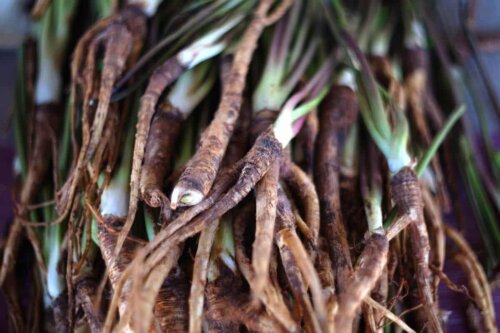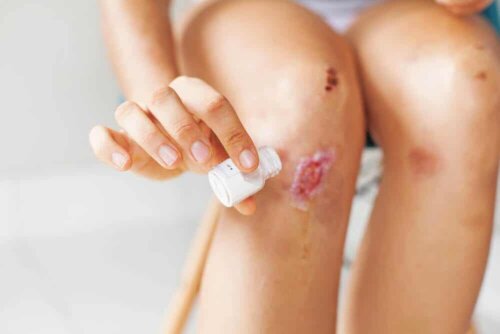Benefits and Contraindications of Angelica Root


Reviewed and approved by the pharmacist Franciele Rohor de Souza
Angelica root particularly refers to the species Angelica archangelica or Angelica sinesis. It comes from a perennial plant that grows in Asia and several European countries. People have used this plant for medicinal purposes for years because it has chemical substances with pharmacological potential.
Specifically, specialists believe it to help in the treatment of digestive disorders, menopause symptoms, joint pains, and sleep disorders. However, there’s little scientific evidence to support the properties people believe it to have. So, what do the studies say? Let’s take a look!
What is angelica root?
Angelica is a species of plant that grows up to almost 10 feet tall. These plants have clusters of showy green or yellow flowers that later become small fruits. Due to its composition, this plant emits a strong and unique smell that people often describe as earthy or herby.
Angelica root comes specifically from the species Angelica archangelica or Angelica sinesis. We also know the former by the name of “wild celery” or “Norweigan angelica” and it grows in European countries. Although many people use it for medicinal purposes, some people also use it for cooking!
Interestingly, the species A. sinesis has the popular name of “female ginseng” and originated in China. Many east Asian countries cultivated it as well, and they value it for its effects on hormonal issues in women.
Uses for angelica root
The species A. archangelica doesn’t only have uses as a natural remedy; on occasions, people have enjoyed it to create gin and other varieties of liquor. Alternatively, A. sinesis angelica root stands out for its natural medicine uses, especially when considering women’s health.
In fact, its supplements can be found as capsules, liquids, and teas. Specialists are yet to establish an exact standard dose, but it often varies between 1/100 oz. and 7/100 oz. of powdered root or root extract.

Benefits of angelica root
Many of the benefits that people believe angelica root to possess come from anecdotal data. In fact, as of today, there are no solid studies that demonstrate that it’s effective and safe as a treatment for illnesses. For that reason, before anything else, we must clarify that you shouldn’t use it as a first-line therapeutic option.
You should consult a professional about any medical problem that you have. Similarly, you should consult them before taking medication. Now, let’s take a look at some of the most well-known benefits.
Anti-microbial activity
Angelica root has an anti-microbial activity that, it seems, contributes to the relief and prevention of infectious illnesses. A test-tube study shared in Natural Product Communications claims that essential oil with the species A. archangelica removes the bacterias Staphylococcus aureus and Escherichia coli.
Additionally, an investigation published in the Journal of Food Science and Technology details that this product inhibits the mold that grows on nuts, which suggests that it may work as a preservative for food.
Anxiolytic effects
In popular medicine, people use angelica root as a natural sedative to calm nervousness and anxiety. In fact, a study on animals published in the Journal of Traditional Chinese Medicine suggests that the extract of A. archangelica causes relaxation and reduces anxious behaviors.
Other investigations on animals report similar conclusions. Despite this, more investigations are necessary to confirm these same effects in humans. For that reason, you should use it with caution.
Joint health
Supplementing with angelica root extract seems to have positive effects against osteoarthritis and rheumatoid arthritis.
Additionally, a study shared in Bio-Medical Materials and Engineering found that these supplements reduced the inflammatory response and joint damage, and helped with the reparation of cartilage. Another study in Clinical Reviews in Allergy & Immunology reported similar findings. However, specialists still require more evidence.
Menopause
In traditional Chinese medicine, people use products derived from A. sinesis in the hope of reducing symptoms of menopause and other hormonal disorders in women. Even so, as of today, there’s no solid evidence of its effectiveness or its safety over the long term.
However, many people say that angelica root contributes to increasing or maintaining optimal levels of serotonin. According to an article in the journal Planta Medica, this plant helps to reduce the frequency of hot flushes, and other symptoms.
Healing wounds
A review released through Phytotherapy Research claims that A. sinenis and other herbal remedies promote wound healing through stimulating the creation of new blood vessels. Although it lacks specific studies, these extracts may be useful when it comes to superficial wounds.
Anti-tumor activity
Studies both test tubes and animals have reported interesting findings regarding the anti-tumor effects of both A. archangelica and A, sinesis. One investigation shared in the Journal of Integrative Medicine showed that angelica root extracts have anti-tumor potential against breast cancer cells in vitro and in vivo.
Specialists found similar results in studies on cervical cancer, larynx cancer, and rhabdomyosarcoma cells. Specifically, two phytochemicals called angelicine and imperatorin are behind these effects. However, this requires more studies to determine whether humans experience the same benefits.

Risks and possible side effects of angelica root
Angelica root, especially the species A. sinesis, isn’t exempt from causing side effects or interacting with medication. There are reports of cases that associate taking high dosages of this supplement with cardiac and hypertension issues.
There’s also the worry of photodermatitis and contact dermatitis that a person may develop after handling this plant. People that take any kind of supplement with angelica root should avoid excessively exposing themselves to the sun because it increases the skin’s sensitivity to ultraviolet (UV) rays.
Among other things, you should also avoid ingesting angelica root or products derived from it if you’re any of the following:
- Pregnant or breastfeeding
- Taking anticoagulant medicine
- Undergoing treatment with medication for dyslipidemia and convulsions
- Consuming medication that has a warning about grapefruit because angelica contains furanocoumarins
Discover: Properties and Benefits of Elecampane Root
Tips for using angelica root safely
As a first step, it’s important to consult your doctor before taking any angelica root supplement. They’ll help to evaluate if there are any possible risks by you taking it. However, it’s essential to respect the recommended dosage on the label of the product to avoid unwanted effects.
As a general rule, supplements of A. sinesis typically appear under the name of “dong quai” and those of A. archangelica appear as “angelica root”. You should verify which species the product you use contains, in order to ensure that you use it correctly.
Of course, you have to remember that this plant, similar to other herbal remedies, isn’t regulated by the United States Food and Drug Administration (FDA). For that reason, it shouldn’t replace any medical treatments under any circumstances.
All cited sources were thoroughly reviewed by our team to ensure their quality, reliability, currency, and validity. The bibliography of this article was considered reliable and of academic or scientific accuracy.
- Li X, Zhang LH, Lv GH, Wang XX, Jiang WD, Jin YQ, Zhao ZZ. [Comparison on content of ligustilides in different danggui samples]. Zhongguo Zhong Yao Za Zhi. 2013 Sep;38(17):2838-43. Chinese. PMID: 24380307.
-
Chen XP, Li W, Xiao XF, Zhang LL, Liu CX. Phytochemical and pharmacological studies on Radix Angelica sinensis. Chin J Nat Med. 2013 Nov;11(6):577-87. doi: 10.1016/S1875-5364(13)60067-9. PMID: 24345498.
- Aćimović MG, Pavlović SĐ, Varga AO, Filipović VM, Cvetković MT, Stanković JM, Čabarkapa IS. Chemical Composition and Antibacterial Activity of Angelica archangelica Root Essential Oil. Nat Prod Commun. 2017 Feb;12(2):205-206. PMID: 30428212.
- Prakash B, Singh P, Goni R, Raina AK, Dubey NK. Efficacy of Angelica archangelica essential oil, phenyl ethyl alcohol and α- terpineol against isolated molds from walnut and their antiaflatoxigenic and antioxidant activity. J Food Sci Technol. 2015 Apr;52(4):2220-8. doi: 10.1007/s13197-014-1278-x. Epub 2014 Feb 16. PMID: 25829603; PMCID: PMC4375230.
- Kumar D, Bhat ZA, Shah MY. Anti-anxiety activity of successive extracts of Angelica archangelica Linn. on the elevated T-maze and forced swimming tests in rats. J Tradit Chin Med. 2012 Sep;32(3):423-9. doi: 10.1016/s0254-6272(13)60049-7. PMID: 23297567.
- Yang CL, Or TC, Ho MH, Lau AS. Scientific basis of botanical medicine as alternative remedies for rheumatoid arthritis. Clin Rev Allergy Immunol. 2013 Jun;44(3):284-300. doi: 10.1007/s12016-012-8329-8. PMID: 22700248.
- Shou C, Li J, Liu Z. Complementary and alternative medicine in the treatment of menopausal symptoms. Chin J Integr Med. 2011 Dec;17(12):883-8. doi: 10.1007/s11655-011-0932-7. Epub 2011 Dec 3. PMID: 22139538.
- Yang Y, Chin A, Zhang L, Lu J, Wong RW. The role of traditional Chinese medicines in osteogenesis and angiogenesis. Phytother Res. 2014 Jan;28(1):1-8. doi: 10.1002/ptr.4959. Epub 2013 Mar 15. PMID: 23494901.
-
Oliveira CR, Spindola DG, Garcia DM, Erustes A, Bechara A, Palmeira-Dos-Santos C, Smaili SS, Pereira GJS, Hinsberger A, Viriato EP, Cristina Marcucci M, Sawaya ACHF, Tomaz SL, Rodrigues EG, Bincoletto C. Medicinal properties of Angelica archangelica root extract: Cytotoxicity in breast cancer cells and its protective effects against in vivo tumor development. J Integr Med. 2019 Mar;17(2):132-140. doi: 10.1016/j.joim.2019.02.001. Epub 2019 Feb 8. PMID: 30799248.
- Wang Y, Chen Y, Chen X, Liang Y, Yang D, Dong J, Yang N, Liang Z. Angelicin inhibits the malignant behaviours of human cervical cancer potentially via inhibiting autophagy. Exp Ther Med. 2019 Nov;18(5):3365-3374. doi: 10.3892/etm.2019.7985. Epub 2019 Sep 6. PMID: 31602210; PMCID: PMC6777310.
-
Brown AC. Heart Toxicity Related to Herbs and Dietary Supplements: Online Table of Case Reports. Part 4 of 5. J Diet Suppl. 2018 Jul 4;15(4):516-555. doi: 10.1080/19390211.2017.1356418. Epub 2017 Oct 5. PMID: 28981338.
- Jalili J, Askeroglu U, Alleyne B, Guyuron B. Herbal products that may contribute to hypertension. Plast Reconstr Surg. 2013 Jan;131(1):168-173. doi: 10.1097/PRS.0b013e318272f1bb. PMID: 23271526.
- Abugroun A, Gaznabi S, Natarajan A, Daoud H. Lime-induced phytophotodermatitis. Oxf Med Case Reports. 2019;2019(11):470-472. Published 2019 Dec 9. doi:10.1093/omcr/omz113
This text is provided for informational purposes only and does not replace consultation with a professional. If in doubt, consult your specialist.








